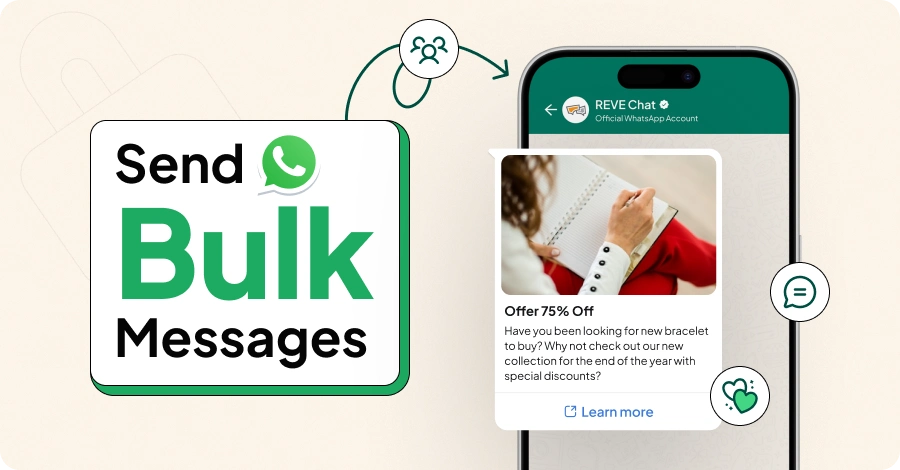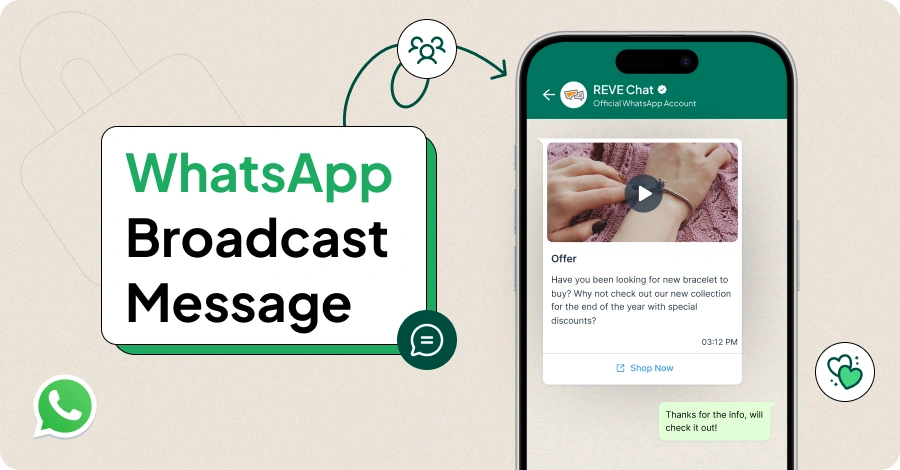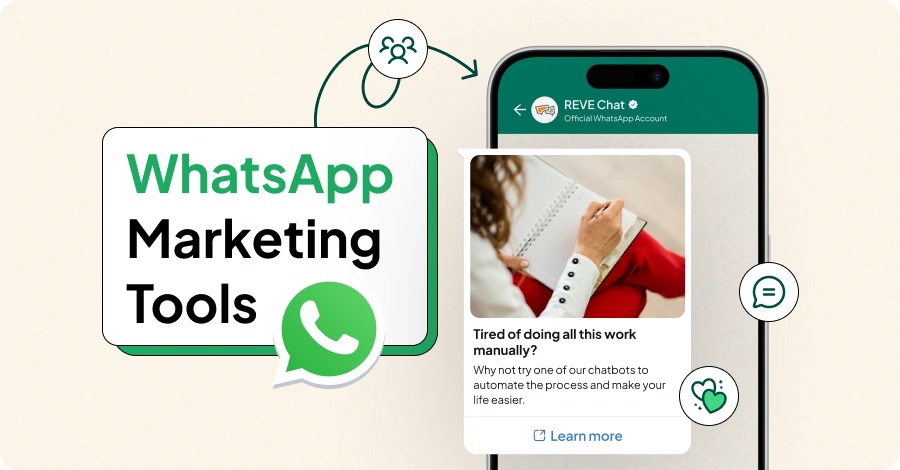How to Respond to a Customer Complaining About Price?
- October 6, 2023
- 19 mins read
- Listen

Table of Content
Customer complaints are inevitable when you run a business. They are a common business practice.
No matter how good your product or service is, some complaints can’t be avoided. Pricing is one of them. Customers routinely express dissatisfaction with pricing, and you need to respond to them to maintain loyalty and satisfaction.
If you don’t know how to respond to a customer complaining about price, you might get in trouble at many levels. This will prevent you from effectively addressing customer concerns and maintaining positive relationships.
So, you need to have a sound strategy to confidently and successfully face pricing-related complaints. You need proper planning to deal with pricing complaints else you might risk losing customers to competitors.
And don’t forget, 86% of customers are willing to pay more for a better service experience. This shows high price is not a concern.
So, whether you’re a business owner or a customer service representative, you need to know how to justify high-priced complaints. If you manage that, customers will feel satisfied and they will find a valid reason to stick with you.
In this blog, we will explore what to say when customers complain about the price, learn about responses to such objections, and understand strategies to deal with them.
Why Do Customers Raise Pricing Objections?
Pricing objections can happen anytime and you should always be ready to handle that. It’s however equally important to understand the reasons behind the complaints. If you know what’s driving customers to raise objections about pricing, you’d better handle the situation.
Let’s look at common reasons why customers say your price is too high –
Budget constraints
Customers complaining about price do not affirm that your product or service is indeed priced high. Sometimes it’s a strategy used by customers to negotiate the price. Maybe the customer is facing budget constraints yet they want to buy your product or service. In that case, they may complain about the price in the hope that you settle for a lower price that suits them.
Search for a better deal
Not all customers are ready to buy when they ask about prices. Some may reach you while exploring the market and looking for a better deal. They are in the market to check the price range and maybe they like your product and want it at lower prices. Most likely, they are seeing quotes from various sources and you happen to be one of them.
The price does not match the value
When customers raise price objections, it’s also likely they are true to some extent. Maybe your product or service is really priced high compared to the customer value it offers. Customers will obviously feel non-committal when the price does not match the value they expect, so may raise price objections.
Lack of interest in your product or service
Complaints about high prices are more common when you adopt a sales-driven approach and reach out to customers for deals. Since customers may not be interested in your offers then, they may use “high price” as an excuse to deter you from selling them. In such cases, the price does not matter as the complaints are due to other issues.
Unaware of typical costs
Some price objections may also arise due to a lack of familiarity with your industry, product, or service. Since customers don’t have much knowledge about how pricing works in your industry, they may raise an objection. To deal with this, you can consider creating itemized quotes with more focus on individual costs adding up to the total.
What to Do When Customers Complaint About Price?
Customers complaining about price is something no business can wish away. The right strategy is to take each complaint as an opportunity to bolster your relationship with them and win their trust and increase customer loyalty. The key is to handle price-related complaints professionally and empathetically. Here are some suggestions on what to do when customers complain about the price rise –
Listen actively – Customers have every right to complain. If they feel the price is unfairly increased, they have reason to feel angry. As a business, your responsibility is to allow them the opportunity to share their views without interruption. You have to listen to them actively and show you value their opinion ( complain).
Empathize – Customers who complain will obviously be upset and angry, so it’s important to stay calm and professional throughout the conversation. Your composure will play a key role in assuaging their anger and diffusing the situation. The key is to be empathetic to their cause as it gives reasons to feel heard.
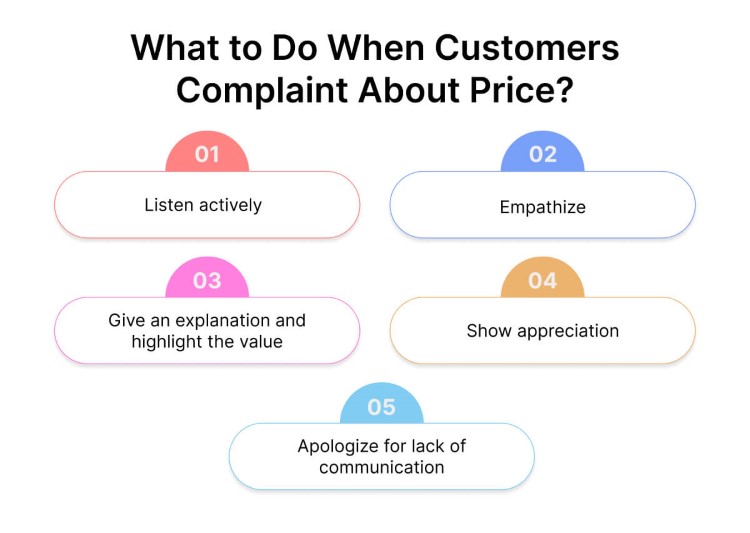
Give explanation and highlight value – Any price increase is justified when it has a rationale behind it. Although customers are less likely to buy all your arguments, you should always provide a clear and honest explanation for the price hike. It’s equally important to highlight the factors that caused the decision, and also emphasize the value available despite the price increase.
Show appreciation – Customers should be encouraged to bring their price rise concern to your attention. This should serve as an opportunity to get their valuable feedback and consider pricing decisions. When you’re receptive to their thoughts and suggestions, it gives them the impression that you’re really interested in what they have to say.
Apologize for lack of communication – Customers deserve an apology if the price increase happens without proper or prior communication. In that case, you should tender an apology for any confusion or misunderstanding arising out of the situation.
What Not to Do When Customers Complaint About Price?
Customers are right when they complain about price increases or any other thing. However, many companies don’t take such complaints seriously and hardly entertain such customers. This kind of customer strategy is bad for the health of any business that aspires to achieve big success and retain most of its customers.
Here are some of the important things a business should never do when customers complain about price:
Ignoring their concerns – A customer who complains about price deserves to be heard. He/she should be valued and respected for the concerns they have. Sadly, some businesses either ignore or dismiss the concerns of customers complaining about prices. This kind of approach is not good in the long run as you might lose the trust of the customer.
Defending the price – Even though your price increase is justified in the wake of rising costs and competition in the market, this does not mean you argue about or defend it when customers come up with a complaint. The right strategy is to adopt a professional approach and help customers see the value and points that led to the price rise.
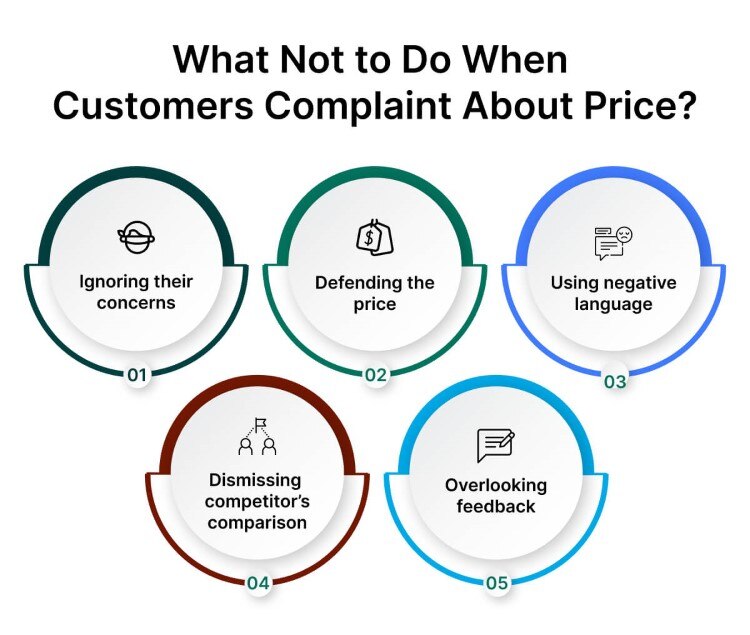
Using negative language – Customers are the pillar on which the foundation of your business rests. If they are not happy about the price, it means they have genuine concerns and you should understand customer pain points. It would be a great mistake if you confronted them or used foul language with them. Such behavior might cause you to lose customers.
Dismissing competitor’s comparison – If customers are complaining about price, it means they are aware of how your competitors are offering the same product at a lower cost. They may bring this point to your attention, so you should be ready to accept the fact without ignoring the truth. Rather, you can highlight the USP of your product and justify the value with the price rise.
Overlooking feedback – Your customers provide the best feedback on your product and service. As a responsible organization, you should see their complaints about price as an opportunity to get feedback and implement the changes. The last thing you should be doing is to overlook the feedback from your customers.
How to Respond When Customers Complain About High Price?
A price revision is sure to bring complaining customers to your door. The key is to be ready to handle a lot of anger, ire, suggestions, and opinions. The best strategy to deal with such situations is to stay calm and wear a professional look. It will help you win new customers and retain existing ones.
Here is the strategy to respond when customers complain about the high price of your product or service –
1. Thank the Customer for Bringing the Issue to Your Attention
Saying a polite thank you is a key step when responding to customers who complain about high prices. It’s also a vital aspect of a customer-centric culture that your organization espouses. More importantly, greeting customers with a thank you will set a positive tone for the conversation, showcasing your commitment to fixing their issues.
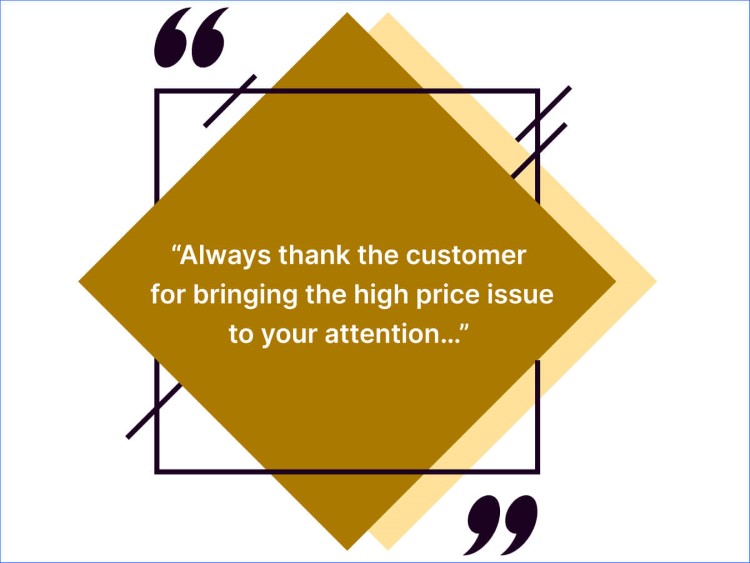
Key Takeaway
- Acknowledge the customer’s concern about the high price
- Show them how you respect their opinions and feelings
- Express gratitude for the feedback
- Take steps to address their concerns
2. Provide the Context For the High Price
A sudden price increase can irk and disappoint customers. When the increase happens without context, it can add to the anger of paying customers. However, customers are less likely to feel aggrieved when the high price has happened after effective customer service communication. So, it’s important to offer a valid context for the pricing and clearly communicate what led to the high price.
Key Takeaway
- Explain the things that have necessitated a price increase
- Provide information that helps customers understand why your product is priced as it is
- Give a peek into various cost components but keep the information concise and clear
- Make your customers understand that your pricing is not random and is rather based on other factors
- Empathize the quality and the cost associated with maintaining unique features
3. Explain Why Your Product and Service is Worth the Price
Customers don’t mind paying high prices when they get value. They may feel a little less disappointed when the price increase is accompanied by unique value or benefits. So, your foremost priority should be on helping them understand the unique benefits and value they get for the price they pay. The key is to effectively communicate why your price is worth what it is. The best way to make customers comfortable with pricing is to show them the value proposition.
Key Takeaway
- Emphasize the benefits that your product or service offers
- Explain how your offers are high-quality with value for money in the long run
- Share social proof, customer reviews, or case studies that demonstrate the satisfaction of other customers
- Make customers understand how your product or service is better than competitors
4. Make Customers Feel Confident in Their Purchase Decision
Customers feel confident when there is a clear and honest explanation of the price rise. This level of transparency not only builds trust but also helps customers realize why the high price is justified. More so, customers are more likely to see value in the product when they know the factors that led to the price increase. Such customers often feel informed and confident in their purchase decisions.
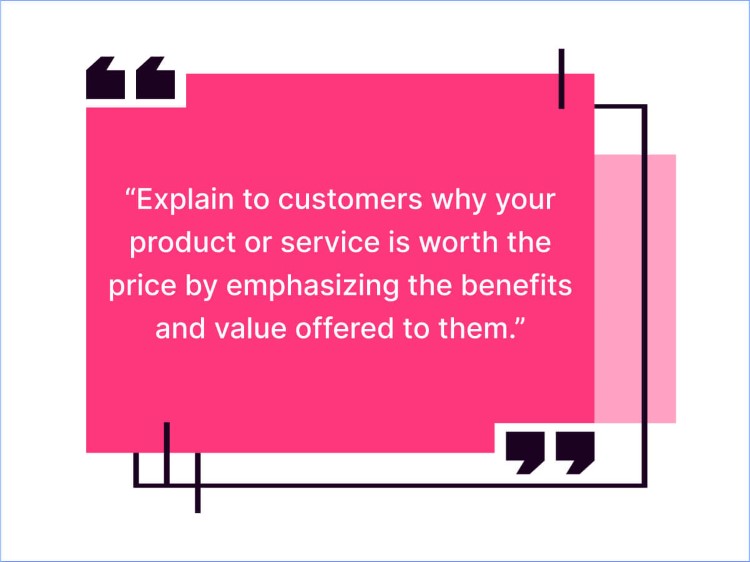
Key Takeaway
- Explain the various components that contributed to the high price
- Discuss how the price is a reflection of your commitment to providing quality
- Compare your pricing to competitors and let customers understand the value they are getting for the money they spend
- Mention how the price changes have been reached after customer feedback
5. Encourage Customers to Share Further Feedback on Price
Understanding customer perspectives is important when it comes to refining your pricing strategy. This will help you better understand what customers expect and what you should deliver. That’s why you should encourage them to share their feedback on price and then show them how you value their feedback.
Key Takeaway
- Ask open-ended questions so that customers feel like sharing their thoughts on the matter
- Use feedback surveys during interactions with customers
- Use live chat support to engage with customers and encourage them to share their concerns about pricing
Your Price is Too High Responses
Customers expect you to respond professionally and tactfully when they voice their concerns about high prices. It’s equally important to maintain a polite tone in your response and be empathetic to their problem. The goal is to provide information that satisfies their concerns and assuages their problem with the price rise.
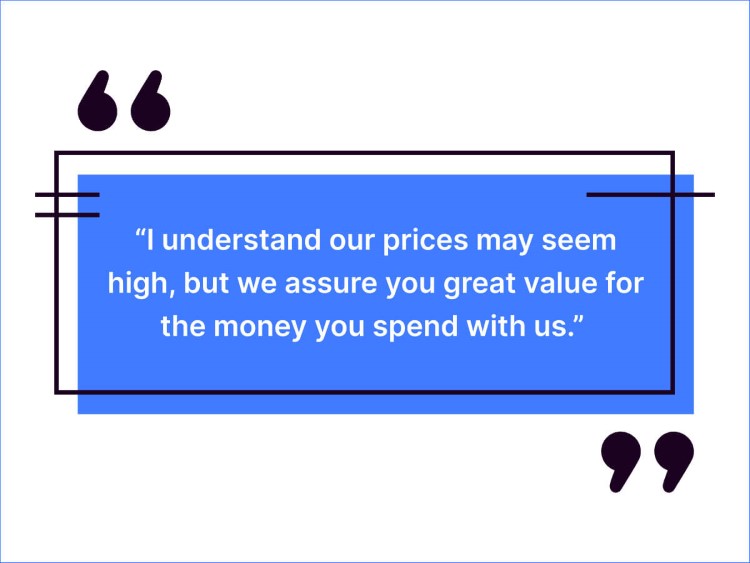
Here are some of the common “your price is too high” responses –
- “I understand our prices may seem high, but be rest assured to get the value you deserve in this price tag.”
- “Our offer is more than competitive. It gives you the kind of benefits and features you look for in this price range.”
- “Our prices are obviously higher than competitors, but let me explain why and you’d definitely agree with that.”
- “We agree that our prices are higher and your concerns are valid, but let me tell you how some of our best customers also initially thought the same before they realized how the prices are fair and competitive.”
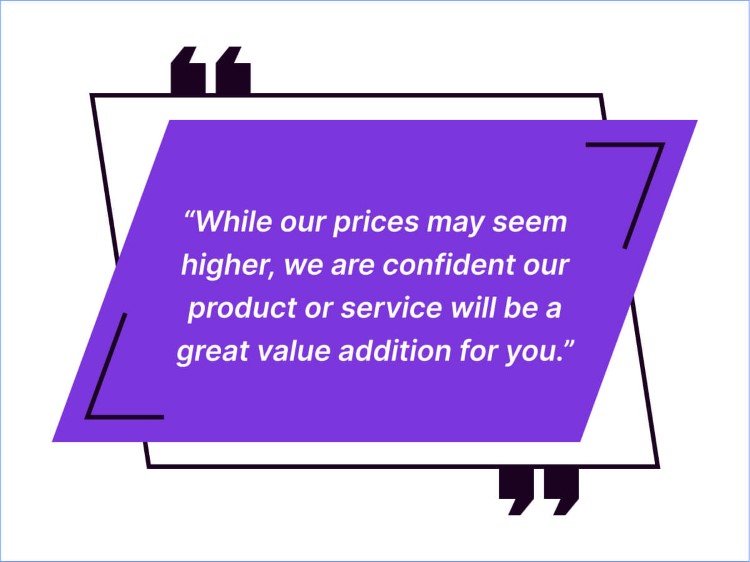
- “Your concerns are genuine, but we can assure you that this price increase was inevitable. In fact, he had held off the rise for a year before it became too difficult to maintain that price point due to various external factors.”
- “It may seem high, but trust me, you are getting a great deal that even our competitors can’t afford to offer you.”
- “Our pricing may seem high but this is something which had to happen sooner rather than later. The earlier prices were not feasible and they could not keep up with the market dynamics. But we assure you that you get a product or service that meets the highest standards.”
- “I concur with your objections to the high price but let me assure you that when you compare our prices to similar offers in the market, you’ll realize that we give a competitive value for the quality you receive.”
- “Your feedback on pricing is much appreciated. We would like to know, is there any suggestion on a specific price point?”
- “While our prices may seem higher, we are confident our product or service is a great value addition for you.”
- “Many of our customers did initially feel the same about the high price, but they have realized how the increase is justified as the product performance and quality has been improved than earlier.”
How to Tell Customers About Price Increase – Example
Netflix is a well-known streaming service that offers award-winning content to its customers across the globe. The wide-ranging shows, movies, and documentaries it streams on a regular basis make it an industry leader and keep its audience happy.
However, in 2011, it had to face widespread customer complaints about a sudden price increase and change to its plans. The complaints happened due to the company’s decision to separate its streaming and DVD-by-mail services as it came with a huge backlash from customers.
Since most customers were happy with Netflix’s bundled service, they found it weird when forced to subscribe to two different plans which would increase the overall cost for them.
Many subscribers felt that Netflix was increasing the cost, so they took to social media and online forums to vent their ire and flood those sites with complaints. In fact, the company witnessed a big surge in cancellations of subscriptions.
Thankfully, Netflix knew how to respond to a customer’s complaint about the price.
The company issued an apology and accepted that it had not communicated the price increase effectively. The then-CEO posted a detailed blog, explaining the reason behind the changes, and gave clarification on the pricing and plans.
While the immediate reaction to the price increase was substantial, over time, customers adapted to the changes, showed faith in Netflix’s vision of producing high-quality content, and made the company a leading force in the streaming category.
The above example shows how a company should face customer complaints about a price increase and act strategically. It also underlines the value of effective communication and the importance of understanding the anger and sentiment of customers with care.
Best Practices to Reduce Price Rise Objections
Handling price rise complaints is never a good situation to be in for any business or customer service agent. However, such situations can be handled effectively if you know how to align your product with customer needs.
Let’s look at the best practices to reduce price objection discussions –
Analyze customer’s concerns
If a customer has price objections, you must listen to that. The more you let the customer speak up, the more clarity you will get about their concerns. You can even encourage them to share their concerns and the reasons behind their concerns about the price. This will help you prepare better responses for discussion.
Focus on showing benefits to customers
If customers see benefits, they will buy, no matter what price you set. That’s why you should emphasize core benefits more and make them the central point of the conversation. The more you discuss benefits and value, the more firmly you can present your product’s prices and make them appear proportionate.
Present your product as a problem-solver for customers
Customers may have some pain points and that’s why they are looking at your product or service to fix that. This should be an opportunity for you to present your offers as a problem-solver for customers. If you could do that successfully and show how price is secondary, you will surely reduce price rise objections.
Show your industry expertise
You could easily justify your price if you can show your industry expertise. This means customers don’t mind paying higher prices when they believe they are engaging with a reliable brand. So, you can use price objections as an opportunity to position yourself as an expert in the industry and this can help minimize customer’s price concerns. After all, trust is a deciding factor in purchases for 81% of customers.
Build confidence through social proof and testimonials
Customers complaining about price can feel assured about your price range when you show them the positive experiences of others. That’s why you should consider using testimonials, social proofs, and reviews showcasing existing customers’ trust in your product and pricing. This will reduce concerns that customers may have about price and other aspects.
Provide flexible pricing options
Rigidity in pricing plans may lead to objections from customers. If possible, you should adopt a flexible pricing model or option to better suit customer’s specific needs and goals. You can thus provide viable options to select if customers feel the pricing is on the higher side.
Use an AI chatbot on your website to give personalized explanations
An AI chatbot can be a great tool to handle price objections when most customers reach you via the website. The bot can provide quick and consistent responses, explaining the reason and rationale behind the rise. The bot can give personalized explanations by using customer data such as the purchase history etc. You can also collect quick feedback via a bot and automate FAQs on price. Plus, there are chatbot templates for pricing queries that you can use.
What to Say When Customers Complain About Price: Key Takeaways
Price complaints are natural and they will happen. You should focus more on handling them effectively rather than hoping to shut them completely out of the way. The best way forward is to understand why customers complain, discuss the matter with them fully, and then devise a plan to handle the situation.
In this blog, we saw what to do when customers complain about prices, including listening actively, empathizing with them, giving explanations and highlighting value, showing appreciation for raising the issue, and apologizing for the lack of communication.
Similarly, we also discussed what not to do when customers complain about price. We understood how you should not ignore their concerns, defend the price, use negative language, dismiss competitor’s comparisons, or overlook feedback.
The blog also touched upon how to respond when customers complain about high prices, including –
- Thank the Customer for Bringing the Issue to Your Attention
- Provide the Context For the High Price
- Explain Why Your Product and Service is Worth the Price
- Make Customers Feel Confident in Their Purchase Decisions
- Encourage Customers to Share Further Feedback on the Price
In addition, we analyzed many “Your Price is Too High Responses”, understood why customers raise pricing objections and explored best practices to reduce price rise objections. In the end, we saw a real-life example of Netflix on how to tell customers about price Increases.
With REVE Chat, you can find a powerful AI chatbot and boost engagement with your customers. The bot will help you interact with customers with price issues and respond quickly and in a personalized manner. You can sign up and check how our bot can add value to your business in more ways.
Frequently Asked Questions
You should respond carefully to a customer who thinks the price is too high. When responding, make sure you –
1.Show the core benefits of your product or service
2.Break down the costs
3.Point the value customers will get for the price
4.Offer different pricing options
5.Provide flexible payment options
You need to be well-prepared to handle objections about price. Follow the below strategies –
1.Let the customers speak up their mind about the price
2.Say nothing when customers are laying out their concerns about price
3.Understand the customer’s pain points
4.Explain the value and benefits of your product/service to your customer
5.Present the cost and benefits in a way that adds value to the customer
Given below are some of the best ways to handle customer objections about price rise –
1.Listen attentively to the complaints
2.Understand the objection in details
3.Respond logically
4.Present benefits and values
5.Show your industry expertise
6.Lay out social proofs and testimonials
Appreciating customers for bringing up the issues and apologizing for lack of communication in price rise is the most professional way to respond when customers complain about price.
Below are the five things to be avoided when customers complain about price –
1.Ignoring their concerns
2.Defending the price
3.Using negative language
4.Dismissing competitor’s comparison
5.Overlooking feedback

